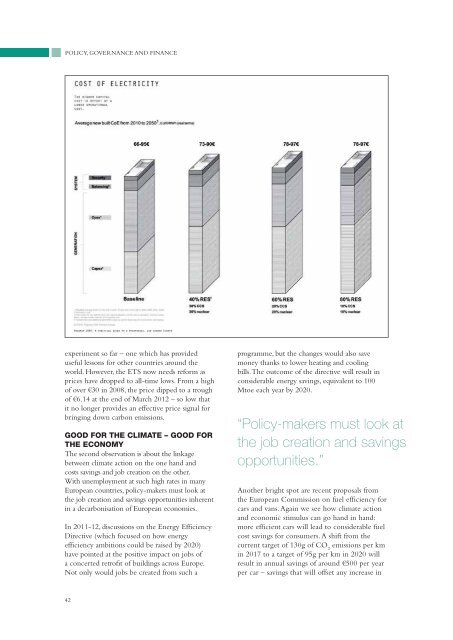Climate Action 2012-2013
You also want an ePaper? Increase the reach of your titles
YUMPU automatically turns print PDFs into web optimized ePapers that Google loves.
POLICY, GOVERNANCE AND FINANCE<br />
experiment so far – one which has provided<br />
useful lessons for other countries around the<br />
world. However, the ETS now needs reform as<br />
prices have dropped to all-time lows. From a high<br />
of over €30 in 2008, the price dipped to a trough<br />
of €6.14 at the end of March <strong>2012</strong> – so low that<br />
it no longer provides an effective price signal for<br />
bringing down carbon emissions.<br />
GOOD FOR THE CLIMATE – GOOD FOR<br />
THE ECONOMY<br />
The second observation is about the linkage<br />
between climate action on the one hand and<br />
costs savings and job creation on the other.<br />
With unemployment at such high rates in many<br />
European countries, policy-makers must look at<br />
the job creation and savings opportunities inherent<br />
in a decarbonisation of European economies.<br />
In 2011-12, discussions on the Energy Efficiency<br />
Directive (which focused on how energy<br />
efficiency ambitions could be raised by 2020)<br />
have pointed at the positive impact on jobs of<br />
a concerted retrofit of buildings across Europe.<br />
Not only would jobs be created from such a<br />
programme, but the changes would also save<br />
money thanks to lower heating and cooling<br />
bills. The outcome of the directive will result in<br />
considerable energy savings, equivalent to 100<br />
Mtoe each year by 2020.<br />
“Policy-makers must look at<br />
the job creation and savings<br />
opportunities.”<br />
Another bright spot are recent proposals from<br />
the European Commission on fuel efficiency for<br />
cars and vans. Again we see how climate action<br />
and economic stimulus can go hand in hand:<br />
more efficient cars will lead to considerable fuel<br />
cost savings for consumers. A shift from the<br />
current target of 130g of CO 2<br />
emissions per km<br />
in 2017 to a target of 95g per km in 2020 will<br />
result in annual savings of around €500 per year<br />
per car – savings that will offset any increase in<br />
42












